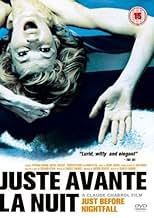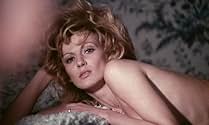NOTE IMDb
7,2/10
2,4 k
MA NOTE
Charles Masson trompe sa femme avec Laura qui est la femme de son meilleur ami François. Un jour, alors qu'elle lui demande de faire semblant de la tuer, il l'étrangle pour de bon. François ... Tout lireCharles Masson trompe sa femme avec Laura qui est la femme de son meilleur ami François. Un jour, alors qu'elle lui demande de faire semblant de la tuer, il l'étrangle pour de bon. François ne tarde pas à découvrir que sa femme le trompait.Charles Masson trompe sa femme avec Laura qui est la femme de son meilleur ami François. Un jour, alors qu'elle lui demande de faire semblant de la tuer, il l'étrangle pour de bon. François ne tarde pas à découvrir que sa femme le trompait.
- Réalisation
- Scénario
- Casting principal
- Victoire aux 1 BAFTA Award
- 1 victoire et 1 nomination au total
Clelia Matania
- Mme Masson
- (as Clélia Matania)
Avis à la une
Fascinating view of middle class degeneracy in two married couples, with the less hypocritical paying to keep the whole facade going. Masochism, murder, desire for absolution, self-sacrifice. The acting and characterisation keep surprising. Like all Chabrol films it links to others in his filmography and will benefit from more viewings.
I love a line in this movie from the executive Masson, he said he had his house designed by a modern architect to avoid the sclerosis of becoming bourgeois. Thats exactly what I think when I see modernist furniture and architecture. It's made for future people, dysfunction-free, productive, and clairvoyant. Only that's not quite how it works out. Here we have post-bourgeois people, who find themselves, like all the best swimmers, more likely to drown. They try to reinvent morality and instead trespass into treacherous areas which the ignorant forbid themselves through superstition, in the process jettisoning the wisdom of ages.
Yes this is a Chabrol film but don't believe it's a thriller, what we have here is more along the lines of Bergman. The police in this film are portrayed as merely being obnoxious, a nuisance to everyone involved in the murder. We are constantly waiting for the detective Cavanna to disappear from the screen.
We have a view here of people whom I'm sure Matthew Barney would call almost crystalline, devoid of potentiality. The film is so awful in this respect that it almost made me glad that we only tend to live eighty years. The tired-eyed men in this movie are weighed down with disillusion and regret, waiting for the end, their successes mere dust. Just before the night, indeed. Gone are their protean days, gone are the Alpheuses of youth. It's not so much a murder thriller as an essay into death. Masson, Tellier et al would welcome the cool breeze whispering through the cypresses on the island of the dead. One startling shot from a train shows Paris in twilight, looking grubby and ready for death itself.
I think more than anything this film is about mortality. Nowhere do we see hot blood in this film, only palsy and the damp skin of the pneumonic, the husband of the mudered woman even comforts the murderer. One part of the movie that I find astonishing is when Masson sees his employee of many many years, who has just been caught embezzling by the police and is now in custody. Masson looks at him with compassion, but the old man, who is now in a sense freer than he ever has been, looks him straight in the eye and tells him to screw himself. Masks off and a bonfire of the vanities.
This film is concentrated sulphuric acid, for more of the same see Les Bonnes Femmes and Les Cousins.
Yes this is a Chabrol film but don't believe it's a thriller, what we have here is more along the lines of Bergman. The police in this film are portrayed as merely being obnoxious, a nuisance to everyone involved in the murder. We are constantly waiting for the detective Cavanna to disappear from the screen.
We have a view here of people whom I'm sure Matthew Barney would call almost crystalline, devoid of potentiality. The film is so awful in this respect that it almost made me glad that we only tend to live eighty years. The tired-eyed men in this movie are weighed down with disillusion and regret, waiting for the end, their successes mere dust. Just before the night, indeed. Gone are their protean days, gone are the Alpheuses of youth. It's not so much a murder thriller as an essay into death. Masson, Tellier et al would welcome the cool breeze whispering through the cypresses on the island of the dead. One startling shot from a train shows Paris in twilight, looking grubby and ready for death itself.
I think more than anything this film is about mortality. Nowhere do we see hot blood in this film, only palsy and the damp skin of the pneumonic, the husband of the mudered woman even comforts the murderer. One part of the movie that I find astonishing is when Masson sees his employee of many many years, who has just been caught embezzling by the police and is now in custody. Masson looks at him with compassion, but the old man, who is now in a sense freer than he ever has been, looks him straight in the eye and tells him to screw himself. Masks off and a bonfire of the vanities.
This film is concentrated sulphuric acid, for more of the same see Les Bonnes Femmes and Les Cousins.
Possibly the best film Chabrol made, along with 'La femme Infidele' and 'Le boucher'. An intense psychological study and not really a thriller this was the first Chabrol film I ever watched. At first I was left confused and disappointed, however this powerful and moving film slowly revealed it's hidden beauty with each viewing.
This film more than any other of Chabrol's has entered my consciousness, Michael Bouquet's acting is very memorable and Stephanie Audran is astonishingly beautiful. There is no hint of mawkishness or sentimentality and one is left moved and glad of so poignant a masterpiece.
This film more than any other of Chabrol's has entered my consciousness, Michael Bouquet's acting is very memorable and Stephanie Audran is astonishingly beautiful. There is no hint of mawkishness or sentimentality and one is left moved and glad of so poignant a masterpiece.
This is the most morally exquisite of Chabrol's many explorations of the human condition. Guilt, forgiveness, revenge coexist and mutually triumph. Many of us assume these three moral stances are mutually incompatible. Chabrol balances them against each other and then fuses them together. The actors reveal their inner dilemmas with gestures more than words. Deep intentions run across surface motives. And the final gesture of this compelling film casts all that went before into another, deeper level. Of course, no deed is as simple as it seems. But few appreciate as Chabrol does here that our all too common morally mixed motives can continue to coexist to the grave. No evil deed is ever straightforward, but neither are the best ones.
Had Chabrol filmed this in the style of Bergman, this film would be a Criterion Classic. But filmed as a thriller, it has sadly failed to gain the audience and admiration it so richly deserves. It is a philosophical triumph!
Had Chabrol filmed this in the style of Bergman, this film would be a Criterion Classic. But filmed as a thriller, it has sadly failed to gain the audience and admiration it so richly deserves. It is a philosophical triumph!
An extraordinary film. Chabrol turns his keen eye and powers of observation to middle-class morality and psychological torment, never losing his rich sense of humor. The characters are complex and their motivations not always easy to discern. Chabrol views them caustically but also with compassion. It is part of a series of several terrific films he made between 1968 and 1973. Most fans of Chabrol consider this his pre-eminent period, and this film one of his very best.
Le saviez-vous
- AnecdotesThis is the last film of Claude Chabrol's 'Hélène cycle', in which actress Stéphane Audran starred, playing characters called Hélène in La femme infidèle (1969), Le boucher (1970), and La rupture (1970). The only film in the cycle which Audran didn't star in was Que la bête meure (1969), the role of a character called Hélène was instead played by Caroline Cellier.
- ConnexionsVersion of L'étranger à l'intérieur d'une femme (1966)
- Bandes originalesSilent Night
Original lyrics by Joseph Mohr and music by Franz Xaver Gruber, French lyrics by unknown lyricst
Played and sung in the Christmas morning scene
Meilleurs choix
Connectez-vous pour évaluer et suivre la liste de favoris afin de recevoir des recommandations personnalisées
- How long is Just Before Nightfall?Alimenté par Alexa
Détails
Contribuer à cette page
Suggérer une modification ou ajouter du contenu manquant































